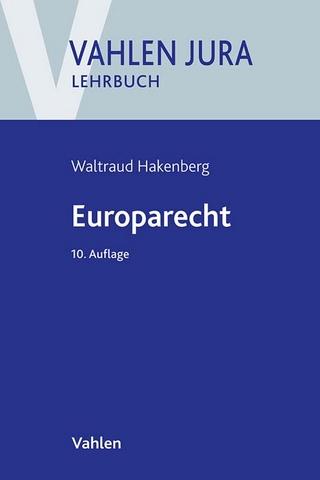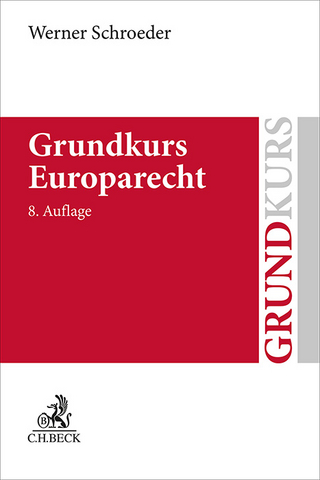
International Judicial Practice on the Environment
Cambridge University Press (Verlag)
978-1-108-49717-6 (ISBN)
More and more environmental cases are being heard and decided by international courts and tribunals which lack special environmental competence. This situation raises fundamental questions of legitimacy of the environmental practice of international courts. This book addresses inter alia questions of who has legal standing to bring an environmental claim before an international court, on which legal norms is the case decided and whether judges have the necessary expertise to adjudicate environmental cases of often complex nature. It analyses which challenges international courts face, which possibilities they have and which advances international judicial practice has been able to make in protecting the environment. Through the prism of legitimacy important insights emerge as to whether international courts and tribunals are fit for addressing some of the most pressing global challenges of our time.
Christina Voigt is Professor at the Department of Public and International Law, Universitetet i Oslo, Norway. She is an expert in international environmental law and works in particular on legal issues of climate change, environmental multilateralism, sustainability, and international courts and environmental protection. She is a member of the International Union for Conservation of Nature (IUCN) World Commission on Environmental Law and the chair of the Commission´s Climate Change Specialist Group. In 2009, she was awarded the first IUCN Academy of Environmental Law Junior Scholarship Prize. She is the author of Sustainable Development as a Principle of International Law (2008), numerous academic articles and several edited volumes. Since 2011, she has been legal advisor to the Norwegian Ministry of Climate and Environment and negotiator in the United Nations climate negotiations.
Introduction: international courts and the environment: the quest for legitimacy Christina Voigt; Part I. Procedural Legitimacy of Judicial Environmental Practice: Access to Justice: 1. The environment before the European Court of Justice Ludwig Krämer; 2. The EU Aarhus Regulation and EU administrative acts based on the Aarhus regulation – the withdrawal of the CJEU from the Aarhus Convention Katja Rath; 3. Access to justice before EU courts in environmental cases against the backdrop of the Aarhus Convention: balancing between pathological stubbornness and cognitive dissonance? Hendrik Schoukens; Part II. Legitimacy and Scientific Certainty – Environmental Adjudication, Use of Experts and the Limits of Science: 4. Scientific uncertainties: a nightmare for environmental adjudicators Tracey Kanhanga; 5. Ignorance, uncertainty and biodiversity: decision making by the court of justice of the European Union Volker Mauerhofer; Part III. Judges as Law-Makers: Legitimate Development of Environmental Law: 6. Sustainable development before international courts and tribunals: duty to cooperate and states´ good faith Kazuki Hagiwara; 7. New legal avenues to support a transboundary harm claim on the basis of climate change Kurt Winter; 8. The Court of Justice of the European Union and the high level of environmental protection – transforming a policy objective into a concept amenable to judicial review Delphine Misonne; Part IV. Legitimacy of Outcomes: Performance, Effects (and Side-effects): 9. When environmental protection and human rights collide: four heuristics of conflict resolution Marie-Catherine Petersmann; 10. Silent implications of US-Tuna II: greening market behaviour through the WTO Cristiane Derani and Arthur Rodrigues Dalmarco; 11. Adjudication of environmental impact assessment claims before international courts and tribunals Andrew B. Loewenstein; 12. Litigation as a climate regulatory tool Jacqueline Peel and Hari Osofsky; Part V. The Legitimacy of Non-Compliance Procedures: 13. Administrative procedures and rule of law values in the Montreal compliance system Anna Huggins; 14. Legitimacy questions of non-compliance procedures: examples from the Kyoto and Montreal Protocol Zerin Savaşan; Part VI. The Limits of Environmental Justice through Courts: Balancing Legitimacy with the Need for Creativity: 15. Environmental Ombudsman: its role in the system of accountability mechanisms for administrative environmental decision making Mahito Shindo; 16. The role of NGOs in monitoring compliance under the World Heritage Convention: options for an improved tripartite regime Evan Hamman; 17. Beyond litigation: the need for creativity in working to realize environmental rights Lisa Chamberlain.
| Erscheinungsdatum | 17.05.2019 |
|---|---|
| Reihe/Serie | Studies on International Courts and Tribunals |
| Zusatzinfo | Worked examples or Exercises |
| Verlagsort | Cambridge |
| Sprache | englisch |
| Maße | 158 x 234 mm |
| Gewicht | 830 g |
| Themenwelt | Recht / Steuern ► EU / Internationales Recht |
| ISBN-10 | 1-108-49717-9 / 1108497179 |
| ISBN-13 | 978-1-108-49717-6 / 9781108497176 |
| Zustand | Neuware |
| Haben Sie eine Frage zum Produkt? |
aus dem Bereich


